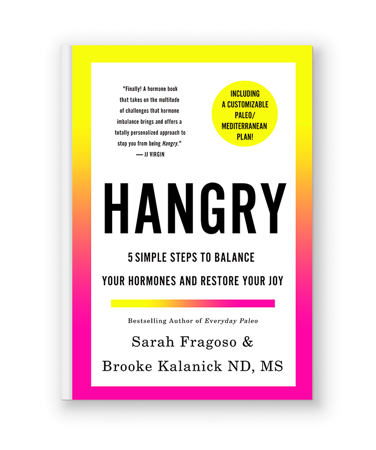
Your body is talking to you all day, unfortunately no one has taught you how to listen. This causes us women to dismiss clues our hormones are sending us about how balanced they are.
These messages come up as symptoms ranging from pesky to severe and in the case of two key metabolic hormones that control our blood sugar: insulin and cortisol, these symptoms are appetite, cravings, energy and sleep. Or more easily remembered as: ACES.
When you start to look at your symptoms as messages or clues from your hormones you can be more objective and less reactive. This means you can take a second, translate the hormone’s message and make BETTER choices, or rather choices that work better for you. Like when that afternoon energy slump hits you’ll know this means your hormones need you to eat more protein and fiber and not grab another double latte.
How many times do we reach for the sugary treat instead of a high protein snack when our energy is in the tank? We feel that intense craving and think we’re getting a strong message that the cookie is exactly what our body need. In reality though, this is not a cookie deficiency but rather blood sugar on the fritz thanks to insulin and cortisol issues.
It’s a bit like your native tongue is German but your hormones speak Japanese. No wonder you’re confused.
It’s OK, how could you have known?
You don’t speak the language! But you can learn it, and you should. When you do, you’ll be able to finally find the elusive sweet spot for carbs, taking you out of the low-carb/low-energy battle or high carb wanna fall asleep after eating war you’ve been losing. The language you need to learn is the hormone talk happening between your brain, your fat cells, your liver, even your digestive organs. Instead of words, your body uses hormones to send get its point across.
These symptoms are like text messages from your hormones – and you rarely message back (so rude right?)
Order Hangry right now!
If you’ve ever felt like a Hangry B*tch and are ready to balance your hormones and restore your joy in just 5 simple steps then Hangry is for you!
GET YOUR COPY NOW
But when you understand what they are telling you you’ll find that elusive “what works for you” more tangible. You’ll be able to take these real time messages about your hormonal balance when it comes to blood sugar, brain chemistry and fat burning.
You can make on the go adjustments – and build longer term habits – to keep your hormones happy so that you can feel better, bolster your health and even lose fat easier if that’s your goal.
So let’s break it down…
Appetite – Whether your appetite is high, low or normal is largely regulated in response to blood sugar balance and your hormones insulin and cortisol. It is also impacted by info directly from your gut (ghrelin), brain and your fat cells themselves (via the hormone leptin).
Cravings – Are largely due to blood sugar swings and thus your hormones insulin and cortisol again. Cravings are also impacted by brain chemistry imbalances with serotonin and dopamine primarily and interestingly, the balance of your brain chemistry itself is largely affected by blood sugar and thus insulin and cortisol come into play again.
Energy – Is all about blood sugar balance, via your stress hormones (cortisol, adrenaline) and your storage hormone (insulin which stores sugar, fat, vitamins, etc.) and also has a lot to do with thyroid hormone levels (are they high enough, are they in the right form, are they getting into a cell for activity—it’s complicated but necessary!).
Also, some very basic but often overlooked causes of low energy include overt or borderline anemias (lack of B12, folic acid, B6 or iron), other nutrient deficiencies such as CoQ10 or carnitine (necessary to metabolize fat as fuel), food sensitivities (can be part of crashing energy after a meal), and inflammation (you feel like you live in a thick cloud that weighs you down and makes you sluggish).
This variable is a bit more complicated than A and C, but addressing insulin and cortisol can largely be done on your own. If you’re still struggling contact me for some more in depth help.
The last letter, S, stands for sleep. When sleep is off (can’t fall asleep or stay asleep) it is typically cortisol at play. Estrogen-progesterone imbalances can also affect sleep because they can hinder optimal levels of serotonin and GABA, making it harder to calm down and fall sleep.
Wondering what hormones may be involved in your wonky ACES? Take my quiz and find out!
Understanding your ACES
Understanding your ACES can feel like you’ve been given a secret hormone decoder ring. Tuning in and working with these signals will help find what you really need to be eating, how you need to exercise and care you need to give to lifestyle issues like stress and meditation in order to keep your hormones happy, energy high and jean size where it feels good to you.
Your ACES symptoms will be affected by what you eat, when you eat it, sleep or lack of it, and stress.
The focus here is on cortisol and insulin, and while there are other hormones involved in appetite, energy and fat loss, these two are what I call master hormones because they have such a ripple effect across all other hormone systems. And they have two other strong points: they talk to you all day via your ACES and they are the ones you have the most control over.
Here’s how:
Simply start to note your ACE daily before and after meals. You’ll need to be a bit of a detective and take some notes both before and after eating, and anytime you feel “off”. Simply write down the time, what you are eating and your A, C and E. S, you’ll obviously write down once per week.
You’ll note these symptom’s before meals:
- sugar or starchy carb cravings
- low energy, fatigue relieved by eating
- feeling irritable, cranky or lightheaded
Note these symptoms after meals:
- low energy or sleepiness
- sugar or carb cravings (not relieved by eating these foods)
- increased hunger even after eating a balanced meal
Then adjust your veggie based fiber, protein intake and tweak your carbs (see this post for exactly how to find your Unique Carb Tolerance) and continue to tune into your ACES and see what adjustments give you a more balanced hormone system.
And remember: it’s not just food. Stress and sleep will profoundly affect your ACES as well.
This system will be taught in depth in our upcoming book: HANGRY and in the live Hangry B*tches groups that Sarah and I run, so get on the waitlist here and have us help you get your ACES whipped into shape!
